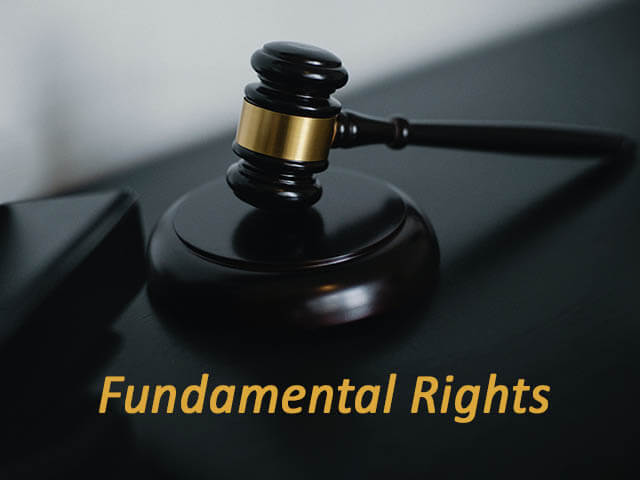Fundamental rights
India was under British control for almost 200 hundred years. India gets independence from Britain on 15 august 1947. British left India but they left India with illiteracy, poverty, gender discrimination, and discrimination on the basis of caste and religion. With these negative aspects, we can build a nation. To build a nation India needs a constitution which will give Indian citizen a better life.
The constituent assembly of India acknowledges the constitution of India on 26th November 1949, which came into effect on 26th January 1950. It contains 395 articles, 22 parts, and 12 schedules. Part III (Article 12 to 35) is related to fundamental rights.
The constitution of India gives its citizen six fundamental rights. Initially, there were seven fundamental rights. But the right to property was abolished. Currently, we have six fundamental rights. Fundamental rights were borrowed from the constitution of the united states of America.

List Of Fundamental Rights
The six fundamental rights given in the Indian constitution are as follows.
1. Right to equality(Articles 14 to 18)
2. Right to Freedom(Articles 19-22)
3. Right Against Exploitation(Articles 23-24)
4. Right to Freedom of Religion(Articles 25-28)
5. Cultural and Educational Rights(Article 29-30)
6. Right to constitutional remedies(Article 32)
1. Right to Equality
This fundamental right says all citizens are equal before the law. This right prohibits discrimination on the basis of caste, religion, gender, place of birth. Equality of opportunity in matters of employment, removal of untouchability, and titles.
2. Right to Freedom
The most important ideals of democracy is freedom. The right to freedom gives Indian citizens freedom of speech and expression, freedom of assembly without arms, freedom of association, freedom of practice any profession, freedom to reside in any part of the country.
The government can impose reasonable restrictions on right to freedom to maintain state security, public morality and decency, and friendly relations with foreign countries.
3. Right against Exploitation
This right focuses mainly on two things one is the abolition of human trafficking and forced labor and the abolition of child labor having age below 14 years.
4. Right to freedom of Religion
The Indian constitution does not consider any religion as the official religion of India. The right to freedom of religion of constitution gives freedom to an Indian citizen to believe, follow and worship according to his religion.
It says that the nation will not discriminate against its citizen on the basis of religion and citizens are free to have faith in their respective religions. This right maintains the feeling of secularism in the democracy of India. This right also gives freedom to establish and maintain religions and charitable institutions.
5. Cultural and Educational Rights
According to this right, all citizens are free to preserve the culture of their choice all citizens are free to take the education of their choice. No citizen of India will be discriminated against for admission in any educational institution on the basis of religion, caste, or gender.
The religious and linguistic minorities have the right to establish and run the educational institutions of their choice.
6. Right to constitutional remedies
This Right is considered as ‘hear and soul’ by Dr. B R Ambedkar of the Indian constitution. According to this right if under any circumstances the fundamental rights of citizens are violated the citizen can approach the court and then the supreme court.
The Supreme court has the power to issue writs for violating fundamental rights. The Enforcement of fundamental rights is the main objective of the right of constitutional remedies.
Conclusion
After discussing the above mention fundamental rights we can conclude that the Indian constitution is the foremost social document. It is written after studying all the constitutions in the world. Any other country in the world is not as much diverse as India.
In India people of different caste, religion, language live together to unite them under one nation we need fundamental rights mentioned in the Indian constitution.
Fundamental rights ensure the rule of law and not of politicians and people in power. At last, even the architect of the Indian constitution Dr. Babasahenb Ambedkar said “No matter how good the constitution is if the citizens who implement that Constitution are not good the constitution is useless. And if the citizens are good and responsible the bad constitution will become good.”
FAQ On Fundamental Rights
1. The fundamental rights in the Indian constitution are taken from which countries constitution?
Ans. The fundamental rights are taken from the constitution of the USA.
2. Which fundamental right is considered as heart and soul of the Indian constitution?
Ans. The right to constitutional remedies is considered as heart and soul of the constitution.
3. Which right and article of the constitution abolished untouchability?
Ans. Right to equality and Article 17 of the constitution abolishes untouchability.
4.Which part of the Indian constitution is related to fundamental rights?
Ans. Part III of the Indian constitution is related to fundamental rights.
5. Which fundamental right give religious or linguistic minorities right to establish and manage educational institution of their choice?
Ans. Cultural and Educational rights mention in articles 29 to 30 give religions and linguistic minorities the to establish and manage educational institutions of their choice.
